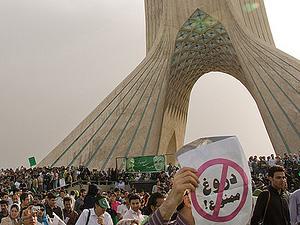Election drama in Iran
Supporters of Mir Hossein Mousavi gathered in Tehran’s streets. (Image: flickr user Yahya Natanzi (cc:by-nd))
"The World’s" Laura Lynch is in the capital of Tehran — to follow is her report on the campaigns and the role that women are playing in this election.
The atmosphere is charged. In the last couple of days, it seemed at times like the whole city has become one giant rally zone. People are out on the streets everywhere — both for the main opposition candidate Mir-Hossein Mousavi and also for President Ahmadinejad — and sometimes they are coming to blows, literally. There are clashes late at night because people are carrying these protests on into the night; but for the most part they’ve been rather peaceful, even though they have been very loud and very energetic. People are not just excited about the whole election process, they’re also respectful of the process.
Women are on the front lines of this campaign. Thousands of women are pouring into rallies, eager to show their support for Mir-Hossein Mousavi. For these mainly younger women, green is the new black. Many have replaced black chadors or headscarves with the green that is the trademark color of the campaign. When their candidate failed to show today, blaming traffic, Mousavi’s increasingly high profile wife didn’t hesitate to step in: As people threw flowers onto the stage, Zahra Rahnavard promised them a return to the ideals of the Islamic revolution but with a modern twist.
Twenty-year-old Farzana takes that to mean greater rights for her and other women: "I’m here just as I want to be free. Just this and nothing else. I’m a woman and I want to be as free as a man."
Mousavi’s wife has become the symbol for women who are using this election to fight for greater freedoms. Rahnavard has appeared at her husband’s side throughout the campaign. That in itself is unprecedented. And she’s not been afraid to stand alone wither. At a recent solo news conference she called President Mahmoud Ahmadinejad a liar; spoke of her passion for her country; then faced questions from foreign reporters.
When asked if she was Iran’s Michelle Obama, Rahnavard said, "I am not Michelle Obama. I am Zahra Rahnavard …"
At a later interview, all but her hands and face were covered in her embroidered black chador. She may dress in a conservative way but Rahnavard doesn’t believe the government’s morality watchdog should tell other women what to wear.
Rahnavard through a translator: "I am 100 percent against the morality police. There’s no such thing in Islam or Islamic teachings, and Iranian women and young people are wise enough to choose to wear appropriate clothing on their own."
When asked if she was worried about whether criticizing Ahmadinejad and criticizing the way he’s running the country would be playing into the hands of western governments who have spent so much time criticizing Iran, Rahnavard replied: "Why should I be worried? I don’t have any expectations from anyone in those countries. I just want to defend Iran’s interests."
Rahnavard’s pronouncements may mark a significant break for political discourse in Iran, but the fact is most Iranians didn’t even hear or see them. They weren’t reported in the official state media. Politics in Iran is still very much a man’s game. Though several women filed papers to run for president, they were all barred from becoming candidates; and some female activists who have worked for change have been jailed. In a park in Tehran built just two years ago, young girls’ faces are a mix of joy and fear as they roll past on roller skates. This is a women-only park. They come in the gate and within minutes the headscarves and bulky clothes come off.
Twenty-two-year-old Masi and her five friends pull out a blanket, some chips and coke, and have a picnic in the shade. Their tops are skimpy and sparkly. Their hair cascades past their shoulders. Masi says she wants equality. But for her it’s not about the clothes she wears; it’s about getting a fair shake in the marketplace: "A scarf is not our problem in our country. Our people want to elect a person who can change our economy, problem of our young people, jobs."
Still Masi worries she’ll have a tough time getting a top job as a civil engineer when she graduates because she’s a woman, so she too is voting for Mousavi.
Political scientist Sadegh Zibakalan of Tehran University sees all the restlessness and all the passion in this election as a precursor to big changes: "I would have thought that political analysts, commentators, historians, experts on Iran cannot ignore what’s happening in Iran today, and I think it will be a watershed of post-Islamic revolution history of Iran."
Most of the women at the Mousavi rally were born well after the revolution and didn’t experience life under the rule of the Shah. They like many other young urban voters are restless for change. That restlessness has translated into an unprecedented debate about the role of women in the world’s only theocracy. But it may be debated endlessly. No matter who wins the election, hard-line clerics still wield a great deal of power and will still make the rules that women have to live by.
More on Iran’s presidential election on "The World."
PRI’s "The World" is a one-hour, weekday radio news magazine offering a mix of news, features, interviews, and music from around the globe. "The World" is a co-production of the BBC World Service, PRI and WGBH Boston.
